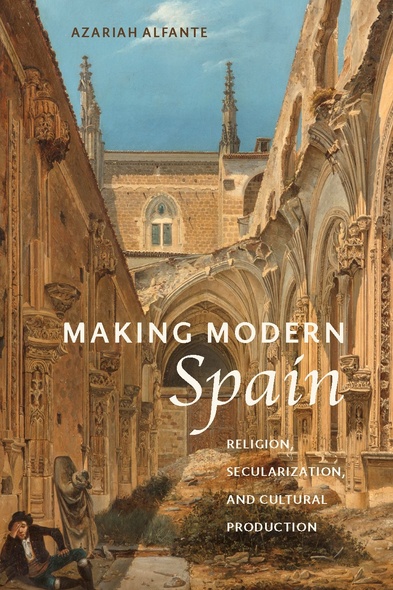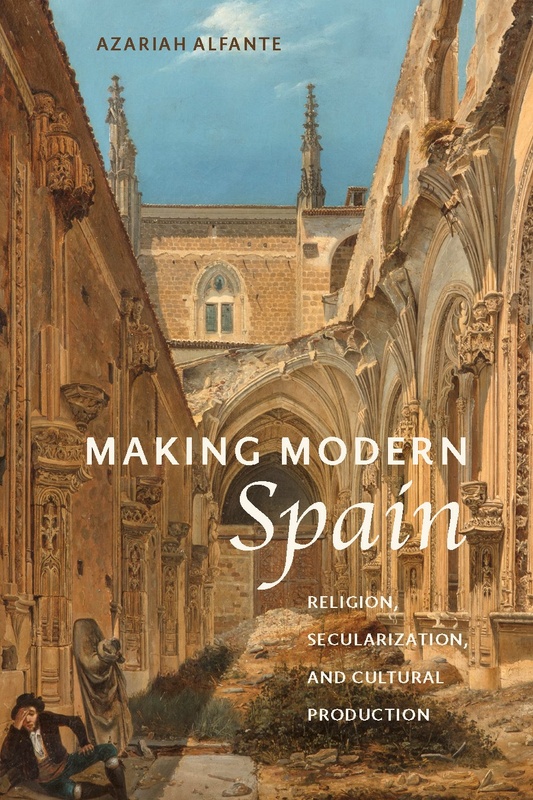
254 pages, 6 x 9
5 color images
Paperback
Release Date:10 Nov 2023
ISBN:9781684484959
Hardcover
Release Date:10 Nov 2023
ISBN:9781684484966
Making Modern Spain
Religion, Secularization, and Cultural Production
Bucknell University Press
In this elegantly written study, Alfante explores the work of select nineteenth-century writers, intellectuals, journalists, politicians, and clergy who responded to cultural and spiritual shifts caused by the movement toward secularization in Spain. Focusing on the social experience, this book probes the tensions between traditionalism and liberalism that influenced public opinion of the clergy, sacred buildings, and religious orders. The writings of Cecilia Böhl de Faber (Fernán Caballero), Gustavo Adolfo Bécquer, Benito Pérez Galdós, and José María de Pereda addressed conflicts between modernizing forces and the Catholic Church about the place of religion and its signifiers in Spanish society. Foregrounding expropriation (government confiscation of civil and ecclesiastical property) and exclaustration (the expulsion of religious communities), and drawing on archival research, the history of disentailment, cultural theory, memory studies, and sociology, Alfante demonstrates how Spain’s liberalizing movement profoundly influenced class mobility and faith among the populace.
Making Modern Spain is a groundbreaking scholarly achievement and required reading for anybody interested in the intersections of literature, culture, and religion in Spain in the long nineteenth century.
Alfante’s work shows us that the spirit, apart from inspiring literary masterpieces, can also be written on stone. A stimulating and insightful addition to our knowledge of religion and its critics in modern Spain.
Making Modern Spain is an illuminating exploration of the ramifications of disentailment through a cultural lens and on an affective level. Azariah Alfante reveals the conflicted feelings about secularization in authors of various political bents, exposing a more nuanced connection between religion, cultural identity, and politics than that found in previous studies.
Taking a deep dive into nineteenth-century Spain’s anxieties about the sacred and the secular, Making Modern Spain rediscovers Spanish romanticism and realism through the lens of disentailment and its human cost. Azariah Alfante demonstrates conclusively that repurposing ecclesial buildings does not only displace those in religious life.
Making Modern Spain is a thoroughly researched piece of scholarship, which represents an original contribution to the study of the intersections among literature, politics, and religion in nineteenth-century Spain. Engaging with theoretical debates on religion and cultural memory, Alfante cogently elucidates the social, cultural, and individual human ramifications of disentailment and exclaustration in nineteenth-century Spanish literature.
AZARIAH ALFANTE teaches Spanish language and literature at the University of Auckland in New Zealand. She has published on nineteenth-century Spanish and Philippine writing and history.
List of Illustrations
Note on Orthography
Acknowledgments
Introduction
Chapter 1: Modern Matter: Disentailment and the Religious Question
Chapter 2: At the Heart of the Nation: Domestic Wellbeing and Spiritual Patrimony in Cecilia Böhl de Faber’s La gaviota (1849), La familia de Alvareda (1856), Callar en vida y perdonar en muerte (1856), and Lágrimas (1862)
Chapter 3: The Hallowed, the Haunting: Remembering and Restoring the Sacred Precinct in Gustavo Adolfo Bécquer’s Historia de los templos de España (1857), Cartas desde mi celda (1864), and Leyendas (1858-1864)
Chapter 4: A New Vital Force: Reconstructing Spain’s Spiritual Body in Benito Pérez Galdós’s Doña Perfecta (1876), Gloria (1877), Mendizábal (1898), and Montes de Oca (1900)
Chapter 5: The Abyss and the Mount: Questions of Faith, Family, and Tradition in José María de Pereda’s El Tío Cayetano (1858-1859), Blasones y talegas (1869), De tal palo, tal astilla (1880), and Sotileza (1884)
Final Reflections
Notes
Bibliography
Index
Note on Orthography
Acknowledgments
Introduction
Chapter 1: Modern Matter: Disentailment and the Religious Question
Chapter 2: At the Heart of the Nation: Domestic Wellbeing and Spiritual Patrimony in Cecilia Böhl de Faber’s La gaviota (1849), La familia de Alvareda (1856), Callar en vida y perdonar en muerte (1856), and Lágrimas (1862)
Chapter 3: The Hallowed, the Haunting: Remembering and Restoring the Sacred Precinct in Gustavo Adolfo Bécquer’s Historia de los templos de España (1857), Cartas desde mi celda (1864), and Leyendas (1858-1864)
Chapter 4: A New Vital Force: Reconstructing Spain’s Spiritual Body in Benito Pérez Galdós’s Doña Perfecta (1876), Gloria (1877), Mendizábal (1898), and Montes de Oca (1900)
Chapter 5: The Abyss and the Mount: Questions of Faith, Family, and Tradition in José María de Pereda’s El Tío Cayetano (1858-1859), Blasones y talegas (1869), De tal palo, tal astilla (1880), and Sotileza (1884)
Final Reflections
Notes
Bibliography
Index







